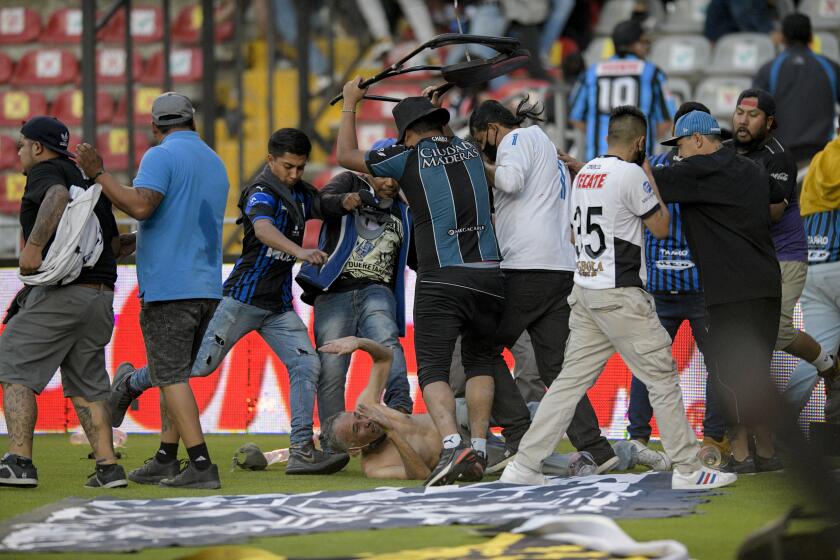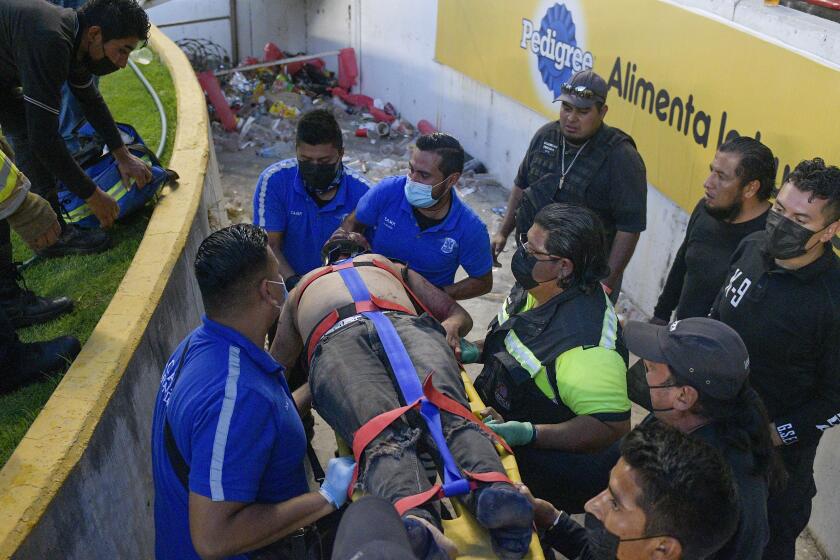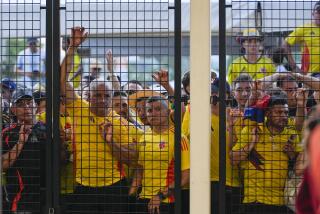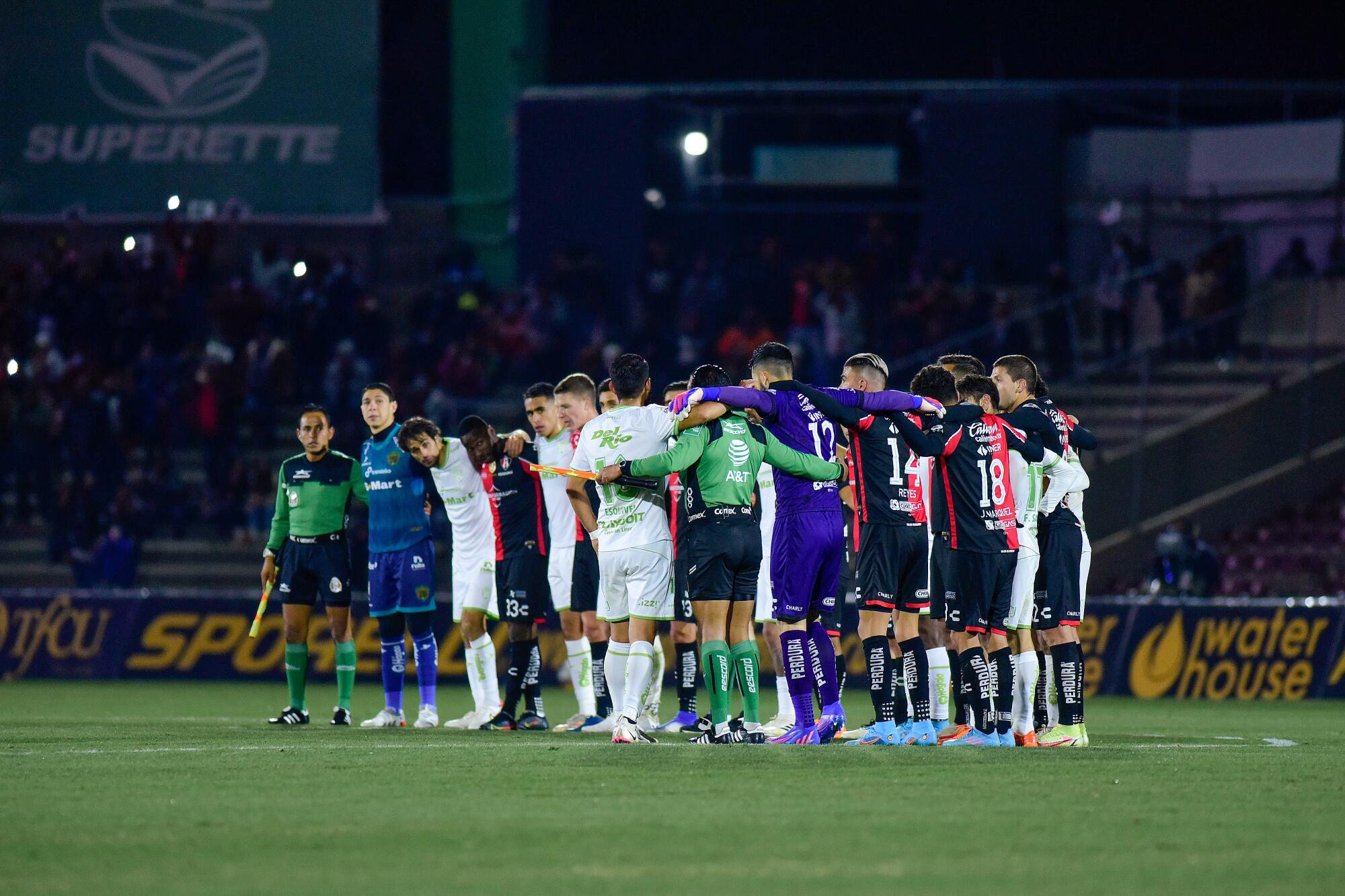
- Share via
CIUDAD JUAREZ, Mexico — Mexico’s domestic soccer league returned to the field for the first time since last week’s bloody brawl in Querétaro, and in Juárez they marked the occasion by releasing a dozen white doves just before kickoff — only to have one of the birds land near midfield and refuse to move, delaying the game with Atlas, the reigning Mexican champion, for several minutes.
Clearly, erasing the memories of the violence that injured 26 fans, left three hospitalized in critical condition and raised questions about unconfirmed deaths is going to take more time than it appeared.
Friday’s game in Juárez was one of three played on Liga MX’s first night back from a weeklong pause. And at tiny Estadio Benito Juárez, regular army troops, camouflaged national guardsmen and members of the municipal police carrying riot shields formed a security corps of more than 500 to watch over a crowd of just 9,000.
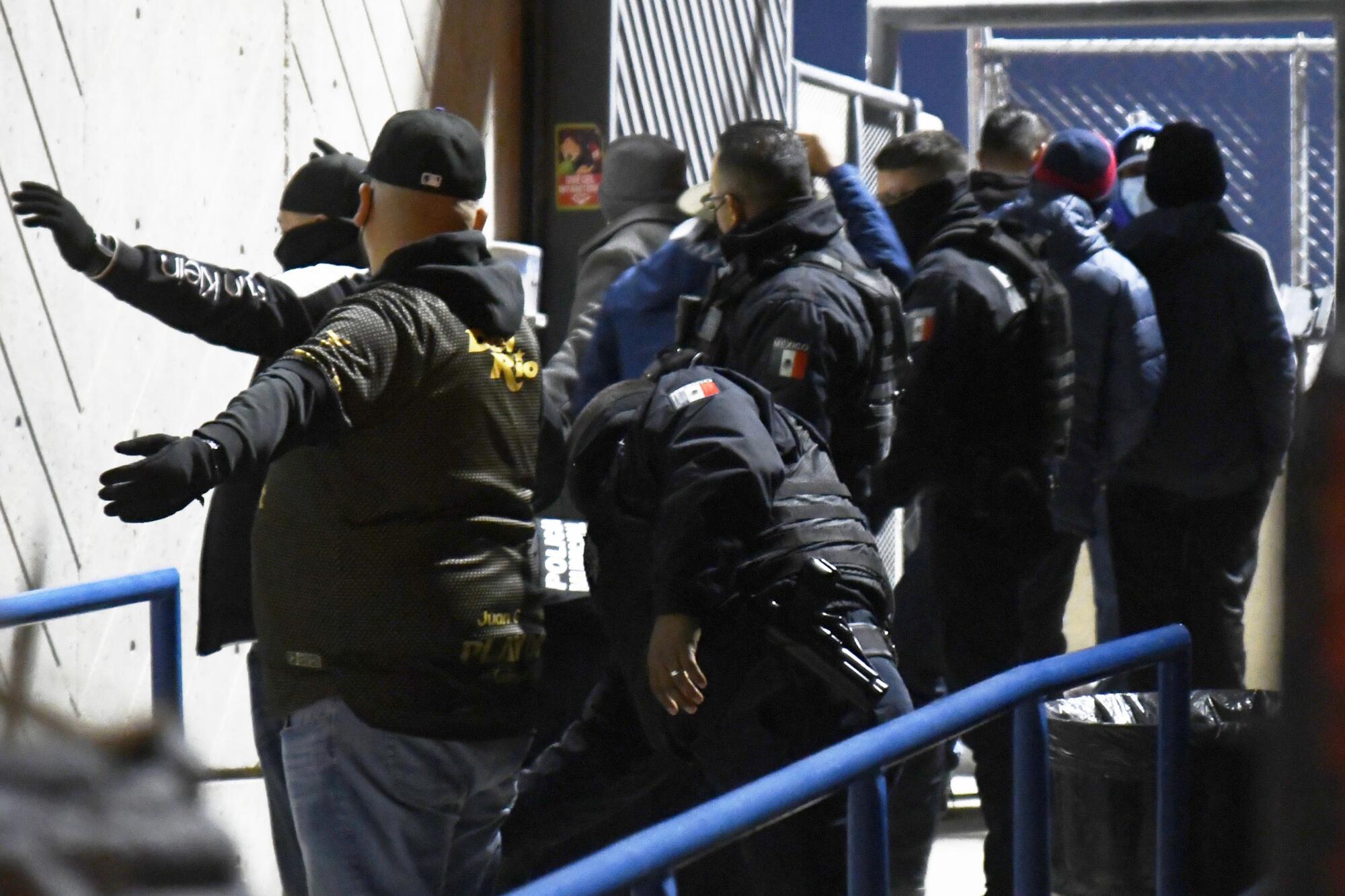
It was a menacing presence, but one many fans applauded.
“It’s really sad, all this,” said Rosy Acosta, motioning toward the riot police as she attended to her son Angel, confined to a wheelchair. “But we feel safer.”
Nearby, Luis Baeza Espino held up a black-and-red Atlas scarf and posed for pictures with his toddler son. They were among many families who braved an unseasonable chill for a night out together.
“It’s very tranquilo here,” he said. “It’s more of a family atmosphere.”
The Liga MX brawl between Atlas and Querétaro fans has left Mexico in mourning, triggering questions about transparency, security and accountability.
That atmosphere has long been under threat in Mexican soccer, which has regularly been darkened by fan violence. Since 2013, at least one match a season has been disrupted by fights or clashes with police, the exception being 2020-2021, when attendance was restricted by COVID-19 protocols. One brawl ended in gunfire.
That has given a black eye to a league that, on the field at least, is generally regarded as one of the best in the world. It’s unquestionably the most popular in North America, with the average viewership in the United States on Univision more than doubling the audience for Major League Soccer games.
As a result, MLS and Liga MX, as the Mexican league is known, have embarked on a number of potentially lucrative partnerships, including a midsummer All-Star Game and an annual monthlong tournament, the Leagues Cup, that will debut next year and include all 47 teams from both sides of the border.
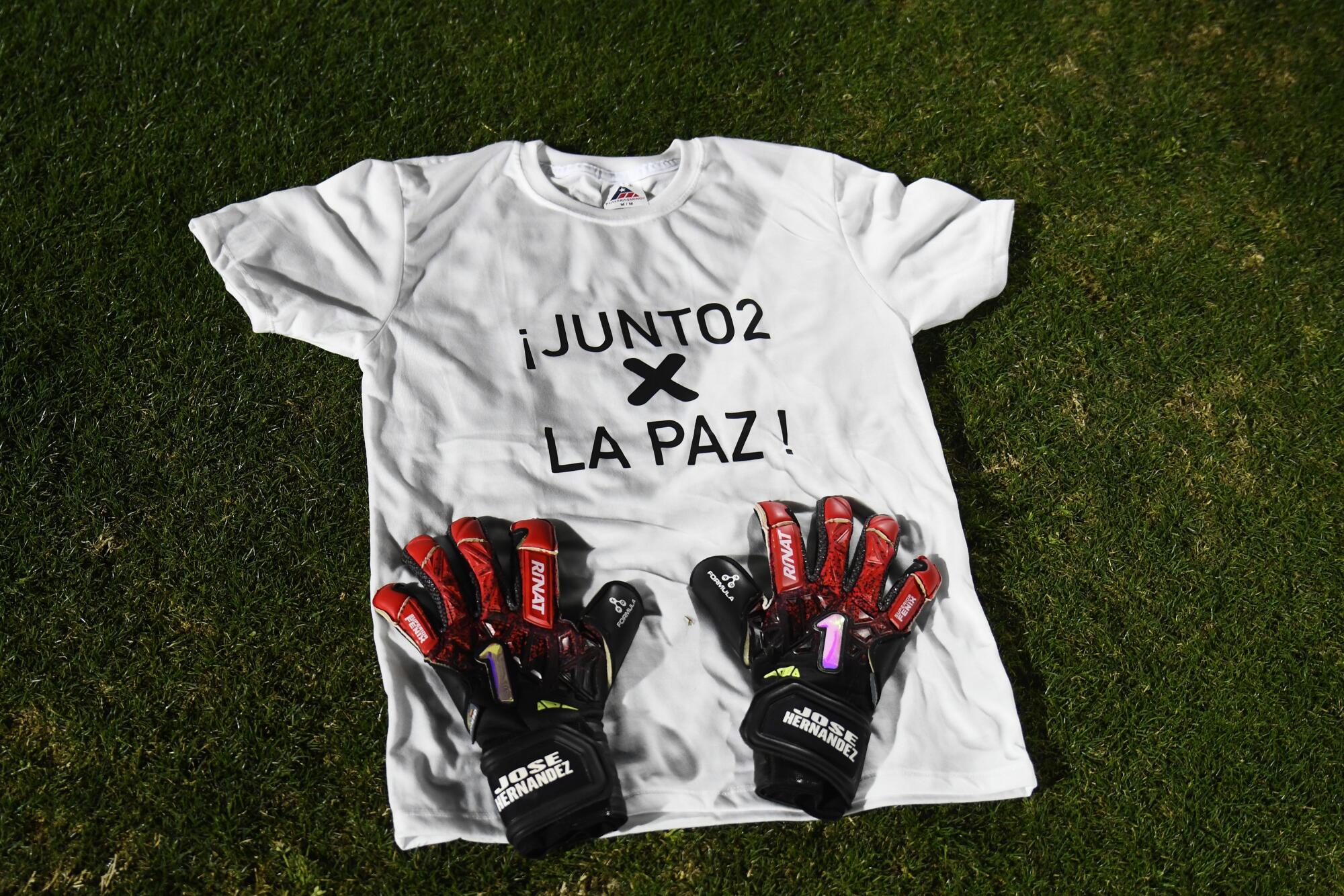
Violence in the stands has put all that at risk so Mexico’s soccer establishment responded decisively after last week’s riot, suspending Querétaro owners and management from the league for five years and ordering the team be sold by the end of 2022. In addition, Querétaro, based 135 miles northwest of Mexico City, must play its home games in an empty stadium for a year and members of its main supporters’ group are banned for three years.
Among other measures, league president Mikel Arriola is also requiring the league’s other 17 teams to segregate its main supporter groups, known as barras, in specific areas of their stadiums that will be closed to minors. To give teams time to harden security measures and to enact the sanctions, Arriola paused the schedule for a week before allowing play to resume Friday.
Daniel Guerrero, a 27-year-old from Juárez, applauded the measures, even if it meant enduring multiple pat-down searches before taking his seat.
“A lot of people use the stadiums to cause problems,” he said. “Those kinds of people shouldn’t be allowed in.”
Mexico’s Liga MX announces significant sanctions in the aftermath of the bloody riot that occurred at the Atlas versus Querétaro match Saturday.
A week ago, Atlas fans had to hide their colors to avoid becoming targets of rampaging Querétaro supporters, who chased them onto the field to continue their assault. On Friday, Guerrero, surrounded by soldiers and peaceful Juárez fans, proudly pulled on a bright red-and-black Atlas jersey just outside the stadium entrance.
“It’s really different, the atmosphere from one city to the next,” he said.
Which is why Arriola’s swift actions won wide praise.
“A select few of these individuals decided they were literally going to try to kill each other over a game,” said Hérculez Gómez, a former U.S. national team forward who played six seasons in Liga MX. “Any parent’s worst possible fear is putting your own child in a situation of danger.
“A 90-minute game is being ripped away from the innocence of the sport, is being ripped away by these idiots. And that’s frustrating.”
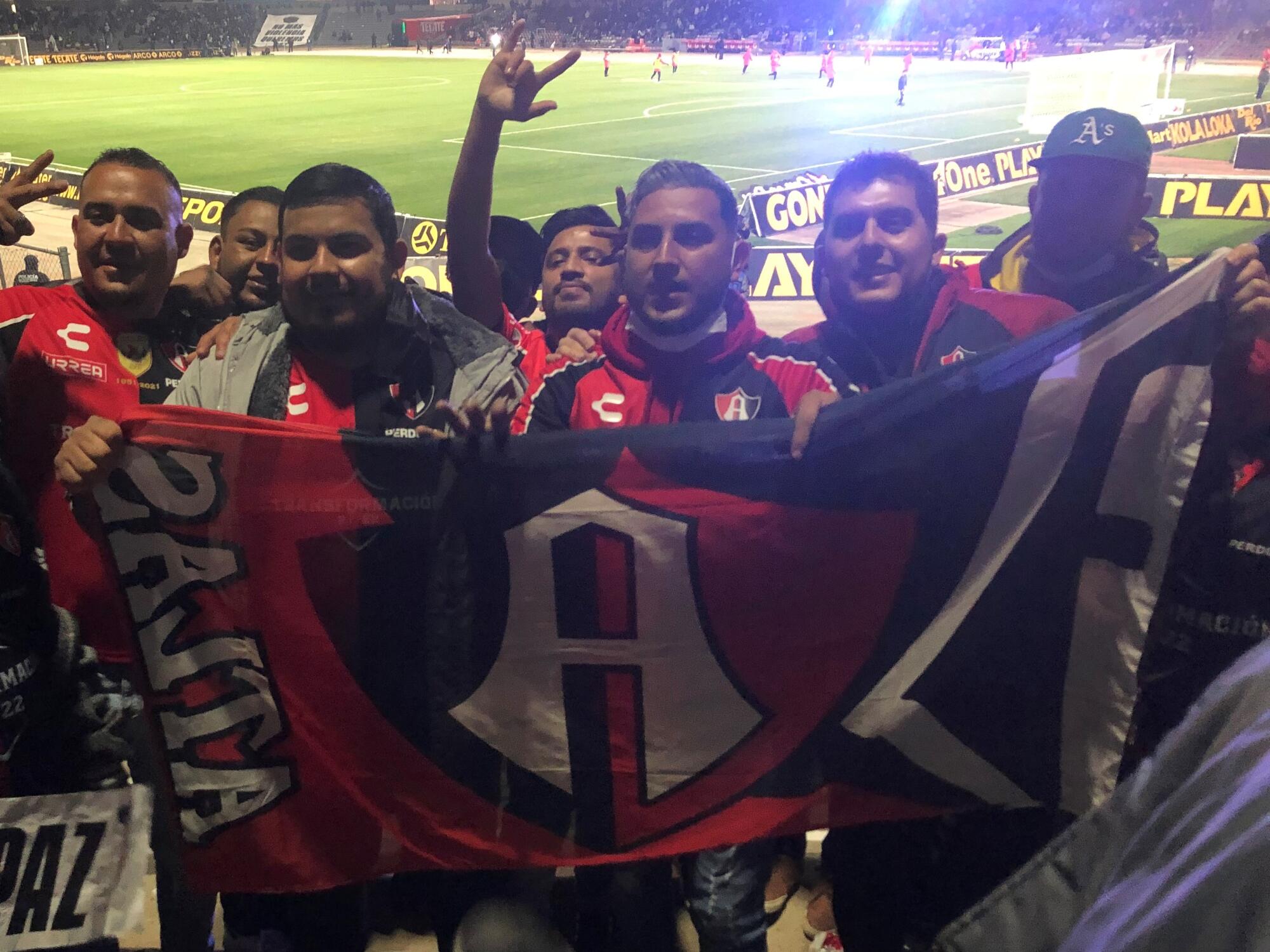
Yet if Juárez and Liga MX are trying to move past last week’s violence, on Friday there were reminders of it everywhere. As fans entered the stadium, they were handed a white sign with the word “peace” written on it. And rather than taking the field in separate lines, as is customary, players from the two teams entered together and massed behind a banner reading “United We’re Stronger.”
At halftime, a parade of children in white T-shirts and carrying white balloons filled the center circle before releasing the balloons into the night. Then 18 minutes into the second half — the same point at which last week’s game in Querétaro was ended by the brawl — the game in Juárez was stopped and players from both teams gathered at midfield to wrap their arms around one another’s shoulders in a show of solidarity and respect.
By then whatever tension had existed pregame was gone. Many of the soldiers, who still had automatic weapons strapped to their chests, were smiling as they took pictures and videos of the fans. Some of the riot police stood cross-legged, leaning passively on their transparent polycarbonate shields and looking more bored than intimidating.
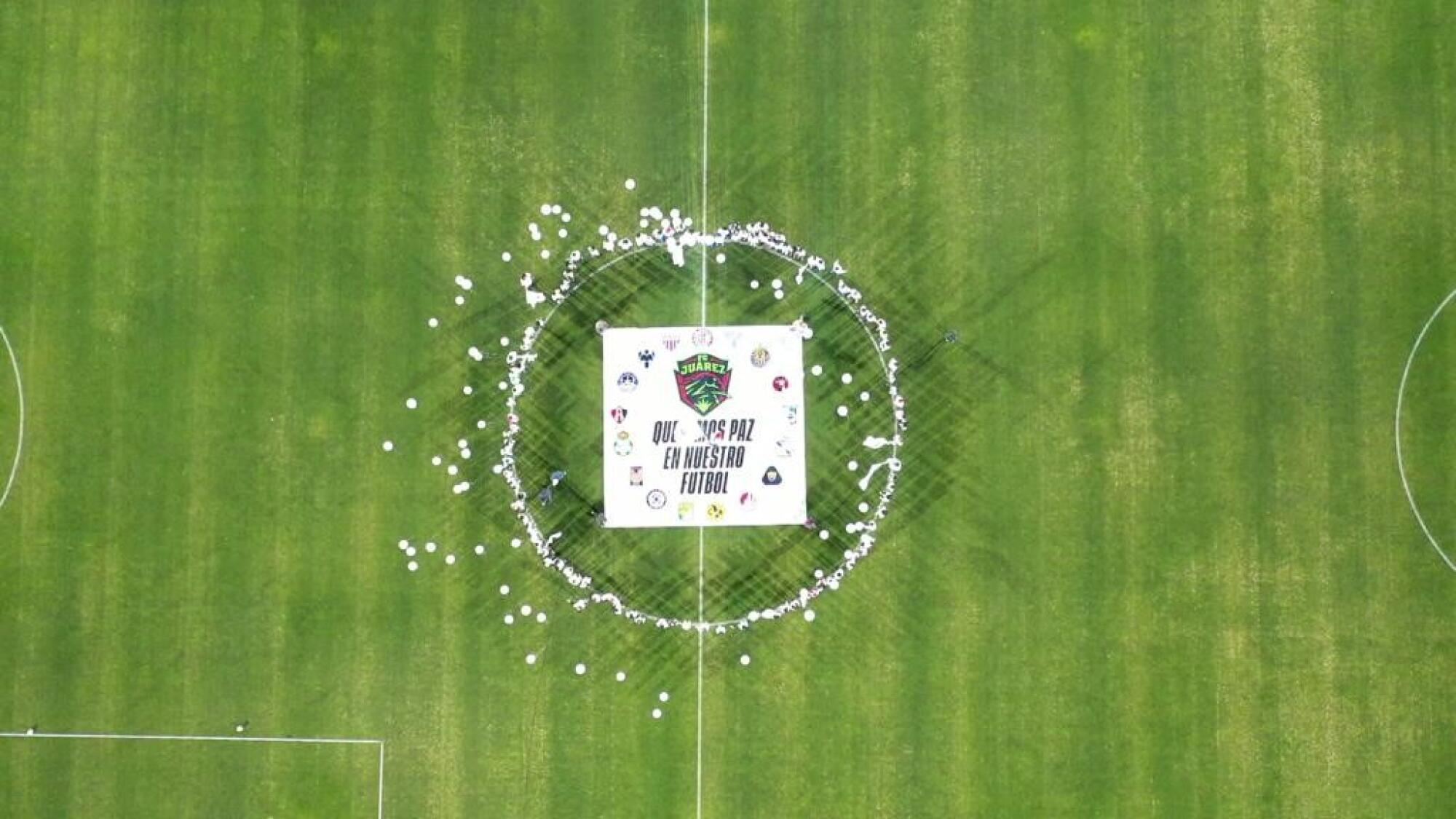
“When something like that happens, you have to take drastic measures to get everybody’s attention,” said Texas billionaire Paul Foster who, with his Mexican-born wife Alejandra De la Vega, is part of FC Juárez’s cross-border ownership group. “You have to take very drastic measures to send a message throughout the league. There is no place for violence at any sporting event.”
“Here, it is a family affair,” he added. “And we want to keep it that way.”
He got his wish Friday, with a night that was more festive than foreboding. Which isn’t to say it was a completely happy one for the Juárez faithful.
Colombian forward Julian Quiñones, who corralled the petulant dove at midfield and lovingly cradled it off the pitch to allow the game to begin, scored the first goal and assisted on the second in a 2-1 Atlas win that extended Juárez’s winless streak to six games, dropping it out of the Liga MX playoff picture.
As the players rushed off the field, some fans pelted them with boos, but that’s as worked up as the chilly crowd got. For Juárez and the embattled Liga MX, that counts as a victory.

